|
Author: Jethro Malapane, Executive Committee Member of the South African Payroll Association.
Companies have not only had to struggle to keep their doors open after the hard lockdown, but they had to deal with employee expectations. Many employees expected to be paid even if they were not able to work – by no fault of their own or that of their employers. An important case before the Labour Court held that companies were not obliged to pay employees for the period they did not and could not work. Employers were entitled to apply the no-work-no-pay principle. In that case Macsteel brought an urgent application against a planned strike by the National Union of National Union of Metalworkers of South Africa (Numsa) over a wage dispute. The application was dismissed, but the court made it clear that Macsteel was not obliged to pay workers who were not rendering their services during the hard lockdown in April and May. However, in a high court case - Mhlonipheni v Mezepoli Melrose Arch and Others - the judge found that the employer was obliged to pay its workers even if they did not work. The company’s inability to pay the workers forced it into business rescue. It is understandable that not all companies are able to pay its employees during the current crisis. However, it is concerning when they are not assisting employees to apply to the UIF-Covid-19 Temporary Employer/Employee Relief Scheme (TERS). The scheme has been plagued with delays from the onset. Although the Department of Employment and Labour made efforts to ensure a streamlined online application process, employers continued to experience long delays and severe frustration due to the lack of response to their queries. We find that employers have become reluctant to become involved in the process, mainly because of a system that has mostly been ineffective. They took the initiative to apply on behalf of their employees, but because they had no control over the system and the outcomes, they were not able to manage the expectations of their employees that they would be paid timeously. That is probably the most important reason why employers are shying away from assisting their employees. They have shifted the responsibility to the employees. Employees who have completed the application forms found there was only a drop-box at the department’s offices, giving them no acknowledgment that their documentation was adequate and that it would be processed. Employers who are applying the no-work-no-pay principle need to inform their employees about the financial state of the company and its reasoning behind the decision. The company may be able to keep its doors open by not paying its employees, but it also runs the risk of losing its best talent. We understand the frustration of employers and employees alike. However, it is important to continue updating employees from a human resource and payroll perspective. Even if they are disappointed by the UIF delays, at least they stay informed. ENDS MEDIA CONTACT: Rosa-Mari, 060 995 6277, [email protected], www.atthatpoint.co.za For more information on SAPA please visit: Website: http://www.sapayroll.co.za/ Twitter: @SAPayroll LinkedIn: The South African Payroll Association
0 Comments
Author: Jethro Malapane, executive committee member of the South African Payroll Association.
The deadline for the annual submission of earnings statements to the Compensation Fund (COID) is the 30th June 2020. The late deadline is quite unusual and is normally at the end of March, signifying the end of the fiscal year. However, the 31 March deadline coincided with the start of South Africa’s lockdown to curb the spread of the coronavirus. The deadline has since been postponed to the end of May and again to the end of June. The deadline for earnings statements relates to the 2019-2020 year that stretched from 1 March 2019 to 29 February 2020. Employers who miss this deadline will expose themselves to a 10% penalty and interest on the annual assessed fee. The fee must be paid within 30 days of receiving the assessment invoice from the fund. Late Return of Earnings + Late payment = 20% penalty! All employers are required in terms of the Compensation for Occupational Injuries and Diseases Act, No. 130 of 1993 (COIDA) to register with the fund within seven days of employing the first employee, submit returns of earnings and pay assessment fees annually. According to the 2018-2019 annual report the Compensation Fund has paid out R17bn in compensation, medical and pension benefits over the past five years. The Compensation Fund has further confirmed that a total of 367 Covid-19 claims have been lodged with the fund, where the largest number of claims (118) comes from the Western Cape. So far, 67 claims have been accepted for liability, 9 have been repudiated and 42 are pending adjudication. Employers who register and pay their annual fees are protected from being sued by employees who are injured at work or who contract work-related diseases. Employees are protected from financial losses if they are injured at work or falls ill. Compliant employers who have kept their employee records up to date, calculated their fee correctly, submitted their statements on time and paid their fees within the stipulated time will receive a Letter of Good Standing. This letter is an official document that proves the fund will assist employers in paying for any work-related injuries or harm to employees, because payments are up to date. The assessment fee depends on the industry the business finds itself in, based on a risk analysis and the earnings of the individuals. The fund has faced administrative challenges in the past and employers have raised concerns about the unresponsiveness of officials when trying to submit claims on behalf of their employees. The administrative burden and slow responses to employer’s requests for support have led to many using their own employee risk benefits. Employers claim on behalf of their employees and are required to fill in several forms such as incident reports and jump through a few hoops to access the benefits. However, employers who have been persistent enough and who have been following the necessary steps got the assistance and support they needed. The fund experienced some system problems last year. Few companies cannot at this stage afford to pay penalties when they have been given ample time to submit the statements. ENDS MEDIA CONTACT: Rosa-Mari Le Roux, 060 995 6277, [email protected], www.atthatpoint.co.za For more information on SAPA please visit: Website: http://www.sapayroll.co.za/ Twitter: @SAPayroll LinkedIn: The South African Payroll Association To date, the Unemployment Insurance Fund’s temporary employee relief scheme (Ters) has paid over R15,7-billion to 2, 288 295 in its Covid-19 relief payments. Many employers, however, are still having their applications rejected.
Arlene Leggat, Executive Committee Member of the South African Payroll Association (SAPA), says that small, seemingly insignificant discrepancies in submissions are seen as mistakes and will lead to the submission being rejected. “When the relief scheme was made public, the Department of Labour issued guidelines and templates for the submission of files. Like many government - and other - systems, if the submission isn’t in the exact same format as the templates provided, the submission will be rejected,” says Leggat. Even the smallest discrepancies will get an application rejected Everything from the date formats to the termination dates must be written in a specific way, precisely as the template stipulates, to avoid the application being rejected by the system. “There are two different date formats to use in the application, for example. The header date in the application doesn’t have dashes, but the dates in the data section have dashes. Using a comma instead of a decimal point or full stop, for example, will be seen as incorrect by the system. The termination date on the application is also causing a lot of confusion. This date refers to people who have left your employ during this period, if they are still employed, it must be blank. Little discrepancies like these have led to many companies’ applications being rejected,” says Leggat. While the process can be frustrating, Leggat says an employer’s best bet is to download the guidelines that are available on the Department of Labour’s website and do a line-by-line comparison between the template and submission. “Take the sample template that has been issued on the site, put it next to your file, and go through the submission slowly and diligently to make sure that that you have provided everything in the required format. If your submission is 100% aligned with the sample template, then you should get paid,” says Leggat. If at first you don’t succeed, try again Employers who have had their submissions rejected have become despondent and many have adopted a “what’s the point?” attitude. Leggat says that it’s important to persevere with the application process, even if it is tedious. “Many businesses are struggling to pay their workers during the pandemic, which is understandable, but the TERS benefit is available to provide relief. It can be frustrating to go through the process, but please keep at it. Your employees depend on you. In a country where the vast majority of people spend their salaries within days of receiving it, not having their full salaries is only going to compound the economic problem South Africa faces. At the very least, we need to make sure that people are getting paid what they can,” concludes Leggat. ENDS MEDIA CONTACT: Rosa-Mari Le Roux, 060 995 6277, [email protected], www.atthatpoint.co.za For more information on SAPA please visit: Website: http://www.sapayroll.co.za/ Twitter: @SAPayroll LinkedIn: The South African Payroll Association The South African Payroll Association (SAPA) has received several complaints from employees whose salaries have been cut, but their employers aren’t even attempting to claim from the Department of Labour’s Temporary Employee/Employer Relief Scheme (TERS) to ensure their staff isn’t short-changed during the lockdown period.
Arlene Leggat, President of the SAPA, says that many employers believe they won’t receive funds from the TERS, but this isn’t true. “There is a lot of negativity about the TERS and the government’s ability to process payments. The payment system initially had its hiccups, but the reality now is that TERS benefits are being paid out but employers are being too stubborn to apply for the benefits on their staff’s behalf. If your company has had to reduce employees’ hours, cut salaries, or both, it is your responsibility to start the application process so that your employees don’t have a reduced salary during these uncertain times. If you are working for a company that isn’t prepared to claim from the TERS, then you need to notify the Department of Labour so that they can follow up on this,” says Leggat. The TERS is a financial support measure that the government has put in place to support workers and employers during the COVID-19 lockdown. An employee’s daily income, as well as the income replacement rate, needs to be calculated according to the requirements on the website. Salaries that are taken into account for TERS benefits are capped at R17 712 per month per employee. The income replacement rate sliding scale from 38% to 60% then determines the benefit the employee will receive. Who can claim? While there has been a lot written about the government only giving financial support to BB-EEE, Leggat says this is not the case for TERS benefits. “All companies who are registered and pay UIF can claim. If your company’s TERS claim has been rejected and you don’t know why, please contact UIF through their available channels. It is challenging at the moment as calls are not always answered. The other option is to check your file and resubmit.,” says Leggat. How to claim Companies must apply for the TERS benefits and receive money as a lump sum, which they then have to distribute to their employees. To initiate the process, employers must send an email to [email protected], which will trigger an automated reply that will outline the steps and details. Then, applications are made on this website: www.uifecc.labour.gov.za/covid19. “When the system initially launched in April, there were many issues, but these problems have since - for the most - been ironed out. The SAPA commends the Department for rolling out this benefit programme on short notice and we encourage employers who are cutting their workers’ salaries to immediately start their TERS application processes. Their employees’ livelihood depends on it,” concludes Leggat. ENDS MEDIA CONTACT: Rosa-Mari Le Roux, 060 995 6277, [email protected], www.atthatpoint.co.za For more information on SAPA please visit: Website: http://www.sapayroll.co.za/ Twitter: @SAPayroll LinkedIn: The South African Payroll Association Payroll practitioners have access to vast amounts of personal, financial and health-related information of staff.
Arlene Leggat, President of the South African Payroll Association, says the impact of European Data Protection Regulation ("GDPR") and the Protection of Personal Information Bill falls on payroll in terms of action and accountability. “When an employee joins a firm, they provide a wide range of personal information. If they join the company’s medical and provident funds, they supply their health and financial information as well, but at no point did they consent to this information ever being shared. If an employee’s personal information is being requested, what you need to say is: Who’s asking for it? And Do I have permission to give it to them?” Can you send personal information internally? Not necessarily Managers and ExCo often request personal information from the payroll department, but they might not be entitled to this information. Leggat says many employees don’t think they are distributing personal information when it is sent internally, but they are. “Employees didn’t sign away their rights to privacy when they joined the company. If someone is requesting that you access and share an employee’s health records, for example, you might need their consent first. Instead of retrieving and forwarding on information when asked, you need to stop and find out if you need approval to share the information first. Don’t just do something because that’s the way it have always been done,” says Leggat. Other information that cannot be shared without permission includes location information such as phone numbers, email address and physical addresses, biometric data, and employees’ private communication. “A rising number of businesses are using fingerprints and retinal data to give employees access, and with Bring-Your-Own-Device policies at many companies, employees are communicating in their private capacities throughout the day. All of this information is considered ‘personal’ and needs to be processed lawfully,” says Leggat. Robust, documented procedures around payroll are needed 'Processing' is broadly defined as being any operation or activity, including the collection, recording, organisation, collation, storage, updating or modification, retrieval, consultation or use of information. It doesn’t matter whether this processing is automatic or not, and the dissemination of this information in any way also falls under the term. “It’s pivotal for businesses to recognise that the definitions are very broad and that procedures need to be implemented and communicated to manage data security, which has affected every industry in every country across the globe,” says Leggat. Leggat says that payroll professionals should be working with their business’ legal department to create a robust, documented procedure around payroll. Making sure that employees have signed everything before the information is disseminated is key to avoiding future problems. “As the custodians of employees’ data, we are vulnerable to becoming the disseminator of personal information. Payroll and legal professionals need to make sure they are working in an environment where personal data protection is taken seriously. The necessary processes also need to be in place so that payroll professionals can respond to requests promptly,” concludes Leggat. ENDS MEDIA CONTACT: Rosa-Mari Le Roux, 060 995 6277, [email protected], www.atthatpoint.co.za For more information on SAPA please visit: Website: http://www.sapayroll.co.za/ Twitter: @SAPayroll LinkedIn: The South African Payroll Association Authored by: Rob Bothma, Exco member of the South African Payroll Association
Over the past year we have had many discussions with organisations as to where they see their performance management processes going in the future, in light of all the new advanced HCM technologies brought about by the various cloud solutions available. The good news is that many of these organisations are starting to take a serious look at their current processes and how these can be redefined into more value adding processes for both the organisation and the employee. A clear result of these discussions is that having two performance review sessions over a twelve-month period is just nowhere near sufficient enough to have an effective or positive performance management process. Organisations are finally starting to both look at what their overall goal is for conducting performance reviews and what benefits this process has actually realised the organisation, as for too many years now all it has ever really been is a salary increase indicator. And therein lies the problem. Both employees and managers only really looked at the respective objectives and related scores with only one goal in mind – what increase will I give and what increase will I receive- without any real focus on the ongoing improvement of performance, continual employee development or even career and succession planning. Staff members need a solid career plan to give them stability and confidence in their future in the organisation. Although some managers can often be threatened by hard headed or stubborn people, strong independent thinkers are required at all levels in life, and an environment and culture need to be created, where these attributes are encouraged and grown, as this helps many people to grow and thrive. Innovation is the name of the game today. With technology starting to run riot in our lives, people who seek out innovation will become very successful, whether at work or at home. With cloud based applications now becoming one of the preferred options for HCM solutions, they bring with them a whole host of new and exciting innovations. One good example is having an integrated social forum as part and parcel of the solution, enabling employees to both request and provide feedback as and when required. Employees and managers are thus able to build up portfolios of evidence on a regular basis, ensuring that the regular performance discussions become more relevant and meaningful. And of course, having a connected workforce, employees’ performance agreements become a living document. Objectives are no longer set and measured over a fixed period, normally the financial year, but rather objective can be loaded and assessed each with their own start and end dates, breaking the traditional link with the meaningless financial period. In addition, as and when the employees’ work circumstances change so too can their performance agreements be updated, there and then, affording both the employee and the manager the opportunity of continually reviewing objectives, thus ensuring that they are 100% relevant to the actual tasks the employees have been assigned. As mentioned earlier, there is a total inadequacy in having the normal mid-year and full year review for a staff member. The employee’s performance contract should be a living document, with the management and accountability equally shared between both parties. Both employee and manager should be equal partners in the creation of goals as well as all the resultant processes that lie therein, such as planning and execution of ongoing skills development, forward focusing career planning and of course how reward and recognition will be measured and awarded. In summary, employees thrive in an environment where they feel they are appreciated and valued for the contributions they make towards the overall success of the organisation. When the focus of performance is centred around the development of skills and competencies towards their future, a healthy environment is created for managing performance as opposed to those dreaded reviews whose sole purpose is for determining what increase percentage will be awarded. ENDS MEDIA CONTACT: Rosa-Mari Le Roux , 060 995 6277, [email protected], www.atthatpoint.co.za For more information on SAPA please visit: Website: http://www.sapayroll.co.za/ Twitter: @SAPayroll LinkedIn: The South African Payroll Association Companies have been adjusting the remuneration packages of their employees who are working abroad and who will be affected by the change in tax legislation that became effective on 1 March 2020.
The foreign employment income tax exemption is limited to R1,25m per annum. The amount in excess of this threshold will be taxed in SA according to existing tax tables. People who are affected most are those who are working temporarily in tax free or low tax jurisdictions and intend coming home to SA, says Arlene Leggat, president of the South African Payroll Association. Payroll specialists need to do the proper tests to see who will be affected by the change and to ensure that their payroll systems – whether in SA or in the foreign country – are running properly. Know the rules “Companies and their payroll administrators must be sure they know what the rules are, and how to apply them. Make sure you know which of your employees may be impacted, communicate with them and do not leave them in the dark.” She says it should not be the responsibility of the employee to decipher the law to understand how the changes will impact them. It would be smart (for payroll administrators) to calculate the annual income to determine the amount of tax payable above the R1,25 m threshold and to ensure their system is able to calculate it. Leggat says people who are on temporary assignments or work contracts abroad need to consider whether they remain tax resident in SA. The South African Revenue Service (SARS) applies two tests to determine tax status. The one is the ordinary tax resident test and the other is the physical presence (or days) test. South Africans are ordinarily tax resident in SA if they have a permanent home in the country and intend returning there when the secondment or contract abroad comes to an end. If they have a permanent home in the foreign jurisdiction and they have no intention of ever returning to SA, they are not tax resident in SA. Therefore, their foreign income will not be subject to tax in SA. In terms of the physical presence test they are not considered tax resident if they have been outside the country for 91 days in aggregate during the year of assessment and 915 days (183 days per annum) in aggregate during the five preceding years of assessment. Tax credits In most instances South Africans who are working abroad are being taxed on their foreign income in the host country. SA has entered into double tax agreements with a multitude of countries to avoid double taxation. This means a SA tax resident will receive credit in SA for the tax already paid on the income earned in the foreign jurisdiction. Leggat explains that a package of R1,25m - converted into either British Pounds or US Dollars – comes to approximately £63,518 and $81,818 (at current exchange rates). “It is not an impossible salary to earn, but it is certainly more than the average income (in those countries),” says Leggat. ENDS MEDIA CONTACT: Rosa-Mari Le Roux , 060 995 6277, [email protected], www.atthatpoint.co.za For more information on SAPA please visit: Website: http://www.sapayroll.co.za/ Twitter: @SAPayroll LinkedIn: The South African Payroll Association The South African Revenue Service (SARS) recently announced that it will be harnessing Big Data, Artificial Intelligence and self-learning computers to streamline efficiencies and crack down on tax dodgers.
Jethro Malapane, Executive Committee member of the South African Payroll Association (SAPA), says the shift towards more intelligent systems and processes is not only welcome but long overdue. “SARS Commissioner Edward Kieswetter says they can no longer simply talk about the Fourth Industrial Revolution because it’s already upon us. The SAPA commends SARS for redoubling its efforts to build a modern revenue authority,” says Malapane. SARS behind the curve among African revenue authorities Malapane, who is the HR Operations and Payroll Lead – Africa at an international insurance company, manages payroll services for African clients, leading him to deal with revenue authorities from other countries. He says SARS is currently behind the curve when compared with the service from these institutions. “I can’t speak on tax submission processes in all fifty-four countries in Africa, but the revenue authorities in some of the East African countries I work in – such as Uganda (URA), Tanzania (TRA) and Kenya (KRA) – have proven to be more advanced in terms of providing clarity and certainty on tax obligations. Their processes also make it easier for taxpayers and traders to comply,” says Malapane. While the digital technologies and systems at other African revenue authorities aren’t necessarily more advanced, Malapane says that the human element - combined with better processes – are the winning combination. “What makes the process easier is that you can pick up the phone and the person on the other end of the line will generally be able to solve your problem quickly. Locally, the need to go travel to a SARS office still arises frequently. Future-focused systems are good, but focusing on a customer-centric experience by providing helpful, personal interactions is also key,” says Malapane. Assisting the public in the transition is key to success Malapane says the only potential problem he foresees with SARS’ steps to becoming a more technology-enabled organisation is how easy-to-use the new systems will be. “e-Filing was launched twenty years ago, but there are still many people who hire financial professionals to do their submissions because they find it confusing. When SARS implements their new, modern solutions, there must be a system to check that the public understands how to use it and whether it truly facilitates better tax submissions for the companies and individuals. The fact that SARS is recruiting for a Tax Engagement Director tells me that avoiding confusion and aiding the transition is high on their agenda,” says Malapane. He concludes by encouraging payroll professionals, companies and individuals to be aware of SARS’ planned changes and keep up to date with system changes. “SARS isn’t getting rid of their current systems, they are transitioning to smarter, more intelligent and powerful systems. To benefit from the automation and insights that can be gleaned from this, payroll professionals, companies and individuals need to stay up-to-date with new features, tools and processes.” ENDS MEDIA CONTACT: Rosa-Mari Le Roux, 060 995 6277, [email protected], www.atthatpoint.co.za For more information on SAPA please visit: Website: http://www.sapayroll.co.za/ Twitter: @SAPayroll LinkedIn: The South African Payroll Association Jethro Malapane, Executive Committee Member of the South African Payroll Association (SAPA), says the association often receives queries about pay slips. Many times, these queries stem from employees not understanding how their salaries and wages are structured, as well as uncertainty about salary codes.
“There are two types of pay slips - the pre-employment ‘dummy’ pay slip and monthly pay slips. The ‘dummy’ pay slip should include an estimation of what you will be earning along with a detailed explanation. The mistake employees make here is that they don’t take the time to understand the details of what the numbers entail. It might look like your net pay is increasing, but a new employer’s medical aid benefit may cover two dependents whereas your former company’s medical aid benefit covered five dependants, for example, so the new offer reduces the individual’s net worth. It’s important to have a clear understanding of your salary structure and benefits before you join a company,” says Malapane. Look at the salary codes, not your net pay The salary codes on a pay slip are linked to statutory company contributions and company benefits that you may be contributing towards. The payslip consists of Earnings which includes your basic salary, overtime and any other earnings applicable; Deductions which includes PAYE, UIF & any other deductions applicable; Company Contributions which includes all company contributions as per your contract & Fringe Benefits which includes all relevant fringe benefits received by the employee . “UIF is the 2% of your salary whereby the company pays 1% and you pay 1% – the company contribution doesn’t come out of your pay regardless of your salary structure. The Skills Development Levy (SDL) is also a company contribution that doesn’t impact your salary. The benefit deductions on the pay slip is usually the point of confusion. A medical aid benefit, for example, may see the employer contributing 50% towards the benefit. When employees sign a contract stipulating that they will receive a 50% medical aid contribution, they may assume that it is an additional amount on top of their salaries. This would only happen if you sign a basic + benefit salary structure. Many companies in South Africa offer Cost-to-Company salary structures, where an employee’s total cost of employment is calculated.” says Malapane. Transparency and education is needed According to the Basic Conditions of Employment Act, an employer may only make voluntary deductions from salaries if there is a signed agreement between the employee and employer to do so, and if they are legally allowed to. There is also a limit to the total amount that employers can deduct from your salary in terms of Emolument Attachment Orders, namely no more than 25% of your salary or wage, as per the Courts of Law Amendment Act (7 of 2017). He concludes by saying that Payroll & HR has a responsibility to educate employees regarding their pay slips and salary structures. “If an employee had a different impression about his salary structure than what he signed up for, it is a failure on the employer’s behalf. As part of a company’s retention strategy, companies must be transparent and proactive about educating employees on their pay slips.” ENDS MEDIA CONTACT: Rosa-Mari Le Roux, 060 995 6277, [email protected], www.atthatpoint.co.za For more information on SAPA please visit: Website: http://www.sapayroll.co.za/ Twitter: @SAPayroll LinkedIn: The South African Payroll Association As the year quickly draws to a close, the South Payroll Association (SAPA) has been inundated with queries regarding their expected annual bonuses in December.
Jethro Malapane, Executive Committee Member of SAPA, says that many of the enquiries stem from employees who don’t know if their bonus constitutes a thirteenth cheque or a performance bonus. “A thirteenth cheque is essentially an additional monthly salary paid, or 8.33% of the employee’s annual salary, that gets paid to the employee (normally in December or any other month depending on the employer’s contract.) A performance bonus, however, is based on an employee’s individual performance and it is subject to the employer’s conditions as stipulated in your employment contract,” says Malapane. Tax provisions and considerations A bonus amount becomes part of your total taxable income for the year, which may impact your tax bracket and tax provisions should be made. Malapane says that if your contract stipulates that you will receive a thirteenth cheque, then monthly contributions can be made as part of your salary deductions to offset the tax implications of the bonus. “A thirteenth cheque is a guaranteed extra amount that you need to make tax provisions for. Speak to your payroll department to adjust your monthly contributions so that you contribute towards tax each month. Doing this allows you to enjoy your bonus in full in December. If you haven’t done this for 2019, then speak to your payroll professional so that it is in place for next year.” It isn’t possible to make tax provisions for performance bonuses. “With performance bonuses being discretionary, it’s not possible to know how much money you must set aside for tax. The payment of performance bonuses is seldom guaranteed, and employees shouldn’t rely on the payment of these discretionary bonuses simply because they received the bonus over the past few years,” says Malapane. A shift to rewarding performance Many South African companies now offer employees performance bonuses instead of thirteenth cheques. Not only are performance bonuses seen as more motivating for employees, but these bonuses can be determined based on influencing factors such as how the company performed in the past financial year. “Companies have come to believe that offering employees a thirteenth cheque as part of their salary package creates a sense of entitlement surrounding bonuses. A performance bonus, however, allows companies to take stock of its financial performance before the money is divided on a departmental or individual level. High performers often find that they receive a salary increase as well as a performance bonus in December, which is obviously welcome news before the holidays,” says Malapane. He concludes by saying companies should create awareness about the types of bonuses – if any – they are offering employees. “Employees need more certainty on the type of bonuses they will receive as well as the tax implications of these bonuses. Employees should carefully read their employment contract so that they fully understand their remuneration at the end of each year and can make the necessary tax provisions.” ENDS MEDIA CONTACT: Rosa-Mari, 060 995 6277, [email protected], www.atthatpoint.co.za For more information on SAPA please visit: Website: http://www.sapayroll.co.za/ Twitter: @SAPayroll LinkedIn: The South African Payroll Association |
Welcome to the South African Payroll Association newsroom.
Archives
July 2020
Categories
All
|

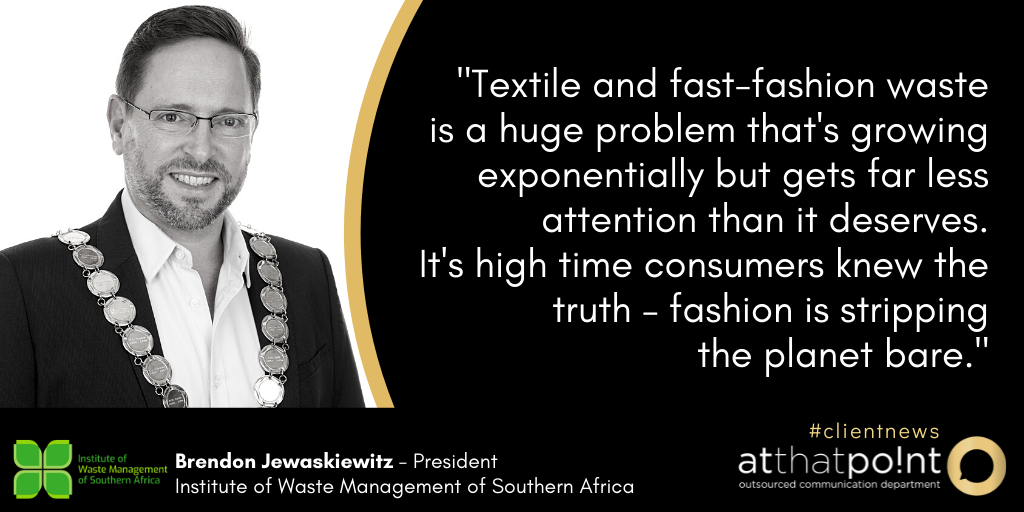
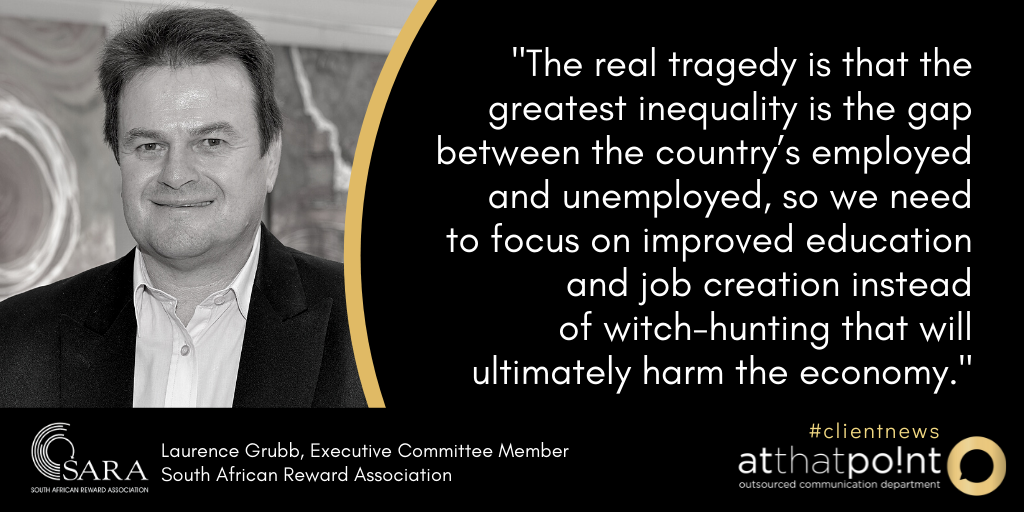
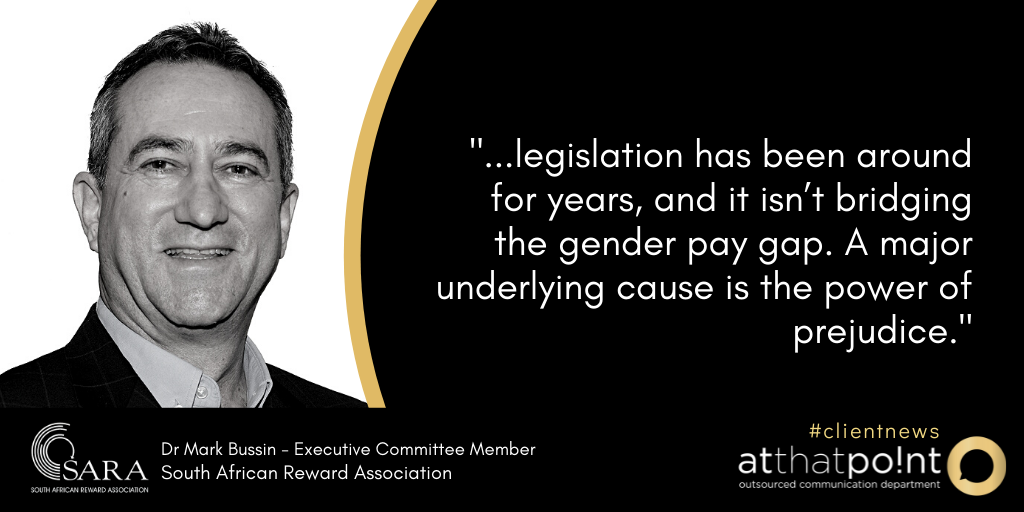
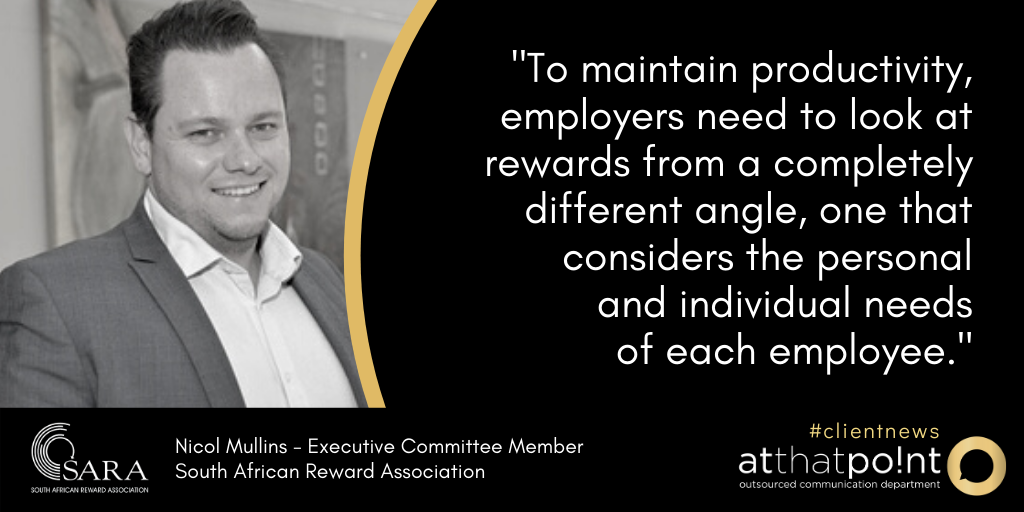
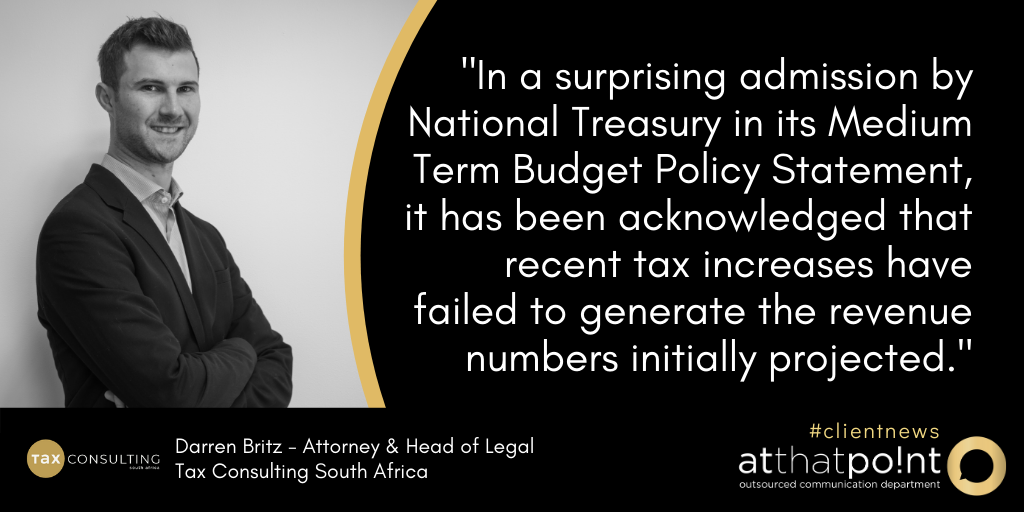
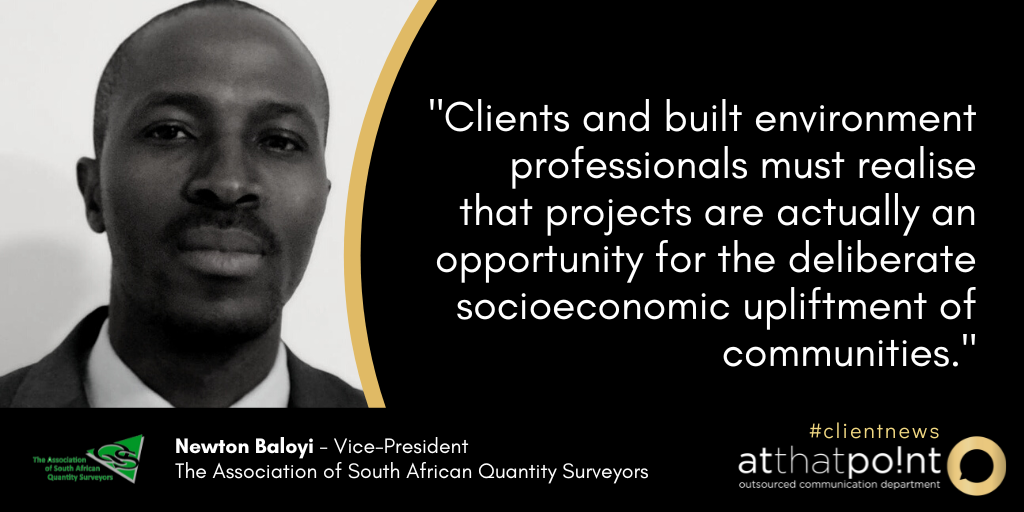
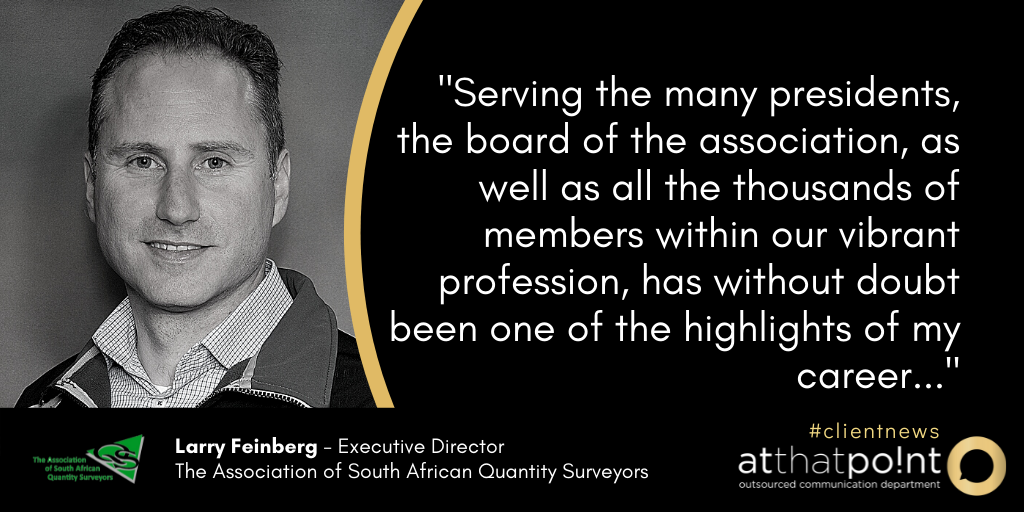
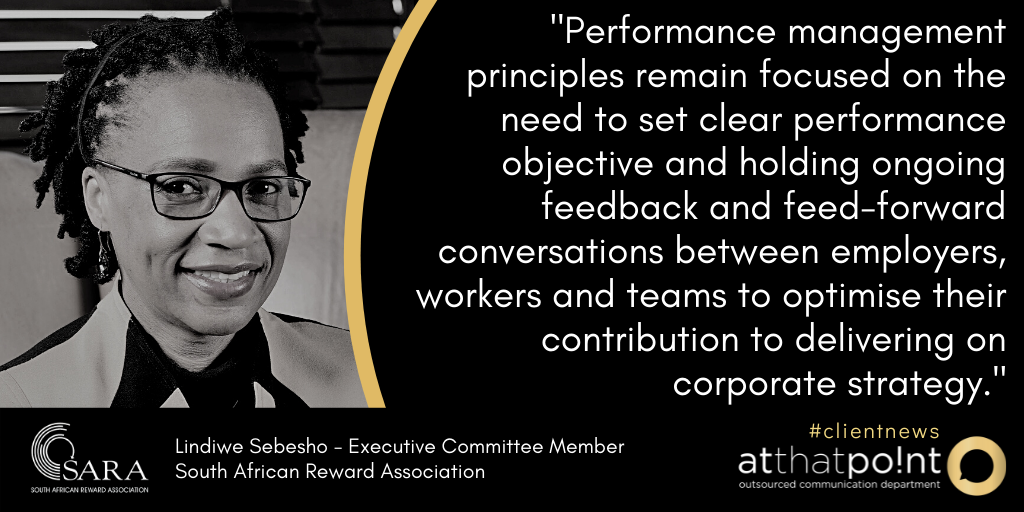
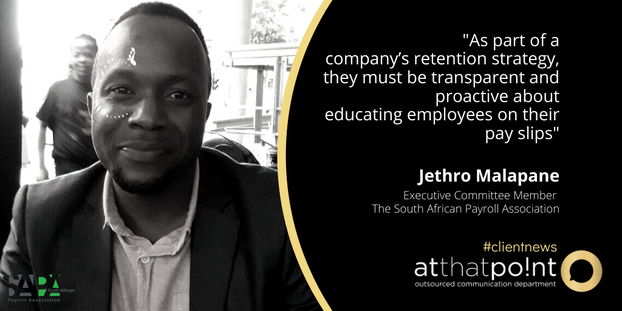

 RSS Feed
RSS Feed